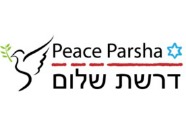 by APN's summer intern Hannah Ehlers
by APN's summer intern Hannah Ehlers
Israel is no stranger to blaring sirens and rockets soaring overhead, crashing violently or intercepted in repeated close calls. Israel also is no stranger to fear—a genuine, existential fear that does not subside even when the rocket fire goes away. Every reasonable person wants peace and knows that violence is not the way to achieve it. But do enough people, Israelis and Palestinians, believe in the possibility of peace to make it happen?
This week’s Torah portion, Pinchas (Numbers 25:10-30:1), addresses implicitly the relationship between violence and peace, and the corresponding responsibility of future generations to maintain peace. It begins by recounting the death of the high-ranking Israelite, Zimri, and the Midianite princess, Cozbi. The zealous Pinchas killed them at the end of last week’s portion by thrusting a spear through their stomachs as they fornicated “before the eyes of the entire congregation of the children of Israel” (Numbers 25:6). God awarded Pinchas and his descendants with priesthood and a “covenant of peace” (Numbers 25: 12). For many, God’s decision is disturbing. Could not Pinchas have at least warned them and asked them to stop before striking the deadly blow? Why would God reward such an impulsive and gruesome act of violence? There are, of course, no definitive answers; however, the Hebrew text in this week’s portion provides some insight.
As Rabbi Lisa Edwards has noted, the letter vav in shalom in the “covenant of peace” that God offers Pinchas is broken, split down the middle—the only time a letter is not continuous in the Torah. In addition, the letter yod in Pinchas’ name is made much smaller than the other letters (Numbers 25:11). This is significant because yod is the first letter of God’s name and of the Hebrew word for Jew. Symbolically, the peace that God offers Pinchas is broken and cannot be made whole. Even when committed out of necessity, and even in the name of God, violence diminishes the good and the sacred and cannot bring about true, lasting peace.
Despite the prayers we recite each week, for peace in our homes, for the land of Israel, and for the world, the modern state of Israel has never known true peace. Israelis have only experienced moments of peace, peace at intervals, wedged between the bloodshed, wars and terror, like Pinchas’ broken peace. The current crisis in Israel and the Palestinian territories is an example of this. Israel has moved from grief to grief, blessed in-between with innovation and achievement, while the Palestinians have experienced perpetual grief under the occupation.
Despite this first-hand experience with terror and fear, according to polls conducted in April 2014, fewer than 9 percent of Israelis consider reaching a peace agreement with the Palestinians to be a top priority. The majority of Israelis believe (as do many American Jews and other Americans) that those who call for peace are naïve and trying to achieve the impossible.No one should be satisfied with the status quo. If we think or accept that nothing can be done, or that we should stop working for what is just and imperative simply because past efforts have failed to achieve peace, we effectively support the status quo. At the recent Haaretz peace conference, David Grossman questioned the majority of Israelis’ attitude towards peace:
We only seriously tried the path of peace with the Palestinians once, in 1993. It failed, and from that moment on, it’s as if Israel decided to seal off that option once and for all… We’ve tried the path of war, occupation, terror and hatred dozens of times, never wearying of it or giving up on it, so why rush to permanently divorce ourselves from peace, of all things, after a single failure?
It does not have to be this way. Attitudes can and must change. We must believe in peace; not in Pinchas’ peace, but in shalom, with a full, intact vav, because it is the only way forward. We will work to attain peace fearful and tired, but also hopeful and courageous; and we will not go in blindly. We have the framework for the only just solution to the conflict: Two states for two peoples, one peace.